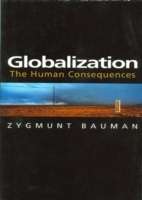Globalization : The Human Consequences

Resumen del libro
a Globalizationa is a word that is currently much in use. This book is an attempt to show that there is far more to globalization than its surface manifestations. Unpacking the social roots and social consequences of globalizing processes, this book disperses some of the mist that surrounds the term.
Alongside the emerging planetary dimensions of business, finance, trade and information flow, a a localizinga , space--fixing process is set in motion. What appears as globalization for some, means localization for many others; signalling new freedom for some, globalizing processes appear as uninvited and cruel fate for many others. Freedom to move, a scarce and unequally distributed commodity, quickly becomes the main stratifying factor of our times.
Neo--tribal and fundamentalist tendencies are as legitimate offspring of globalization as the widely acclaimed a hybridizationa of top culture -- the culture at the globalized top. A particular reason to worry is the progressive breakdown in communication between the increasingly global and extra-- territorial elites and ever more a localizeda majority. The bulk of the population, the a new middle classa , bears the brunt of these problems, and suffers uncertainty, anxiety and fear as a result.
This book is a major contribution to the unfolding debate about globalization, and as such will be of interest to students and professionals in sociology, human geography and cultural issues.
Biografía del autor
Zygmunt Bauman nació en Poznan, Polonia, en 1925 y falleció en la ciudad inglesa de Leeds en 2017.<br> Tras la invasión nazi, su familia se refugió en la zona soviética y Bauman se alistó en el ejército polaco, que liberaría su país junto a las tropas soviéticas. Fue miembro del Partido Comunista hasta la represión antisemita de 1968; la consiguiente purga le obligó a abandonar su puesto como profesor de filosofía y sociología en la Universidad de Varsovia. Después enseñó sociología en Israel, Estados Unidos y Canadá, y fue profesor emérito en la Universidad de Leeds (Reino Unido).<br> En su abundante producción destacan libros fundamentales de la sociología contemporánea como Modernidad y holocausto o Modernidad líquida, o el volumen de conversaciones Vivir en tiempos turbulentos, donde nos brinda un acceso privilegiado a su pensamiento y a diversos aspectos clave de su vida. Zygmunt Bauman mereció el Premio Príncipe de Asturias de Comunicación y Humanidades 2010, el Premio Amalfi de Sociología y Ciencias Sociales (1992) y el Theodor W. Adorno (1998).








